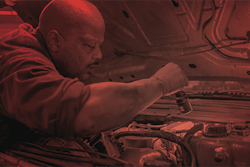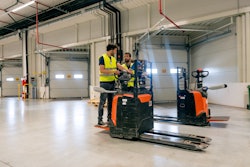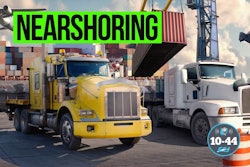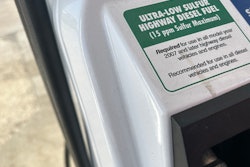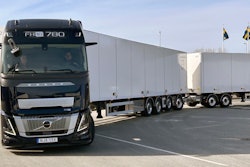Embracing sustainability initiatives isn’t just about being environmentally conscious, it’s also a financial decision.
According to a Geotab industry survey, 69% of fleet managers who implemented sustainability initiatives reported a significant decrease in operating expenses over the previous year. The survey also noted that 42% of fleet professionals believe customers will demand more fleet sustainability initiatives in the next one to three years to continue doing business with them.
As fleet professionals execute ambitious sustainability goals, data intelligence and AI are driving decision-making, said Eric Mallia, vice president of sustainability solutions at Geotab.
“We’re increasingly seeing more fleet operators embrace the cost-saving potential of measurable sustainability initiatives, delivering a ‘double-bottom line’ of operational cost savings and a reduction in emissions,” Mallia added.
Mallia noted that fleet managers should look at the long-term benefits of carbon reduction, which can both reduce emissions and manage costs, including several best practices such as rightsizing a fleet, proactive maintenance and repair practices, route planning, idle reduction, using quality data, and accessing government incentives.
Carriers are also innovating ways to establish cost-efficient sustainability strategies, with many formalizing those plans in Environmental, Social and Governance (ESG) documents.
In its 2023 Corporate Social Responsibility Report, Werner Enterprises said it has reduced emissions by 16% with late model trucks, and is "on the right path to our goal of reducing carbon emissions by 55% by 2035." The carrier is also testing a variety of alternative fuels and alternative vehicles with plans to create a scorecard for energy usage and waste flows – measuring electricity, natural gas and propane usage at all Werner facilities and collecting details on waste streams – which it expects to finalize this year 2024.
In 2022, Illinois-based GP Transco aimed to lower its CO2 emissions, and increased its investment in fuel-efficient semi-trucks. In its 2023 environmental impact report, the company reported that it increased its fleet’s miles per gallon by about 2% – from 7.26 mpg to 7.40 mpg.
“This saves approximately 107,000 gallons of fuel each year; to put this in perspective, that is 3 full-size Olympic swimming pools,” the report said. “We cut CO2 emissions by 15 millions pounds. It would otherwise take a forest the size of the city of Chicago an entire year to absorb this amount of CO2 emissions.”
After testing solar panels on 10 trucks over a six-month period, the dry van carrier is implementing them on its fleet of 600 trucks to further reduce its carbon footprint and costs, estimated to save $1,700 per tractor per year.
Sergey Bort, vice president of marketing and strategy at GP Transco, said that a setback they’ve encountered is hiring drivers. “[They] tend to look down on environmental initiatives, in my experience.” To encourage drivers, the company launched its Fuel Utilization Efficiency Leaders bonus program to financially reward fuel-efficient drivers.
Cost also comes to mind when people think of sustainability. As technology evolves and trucking companies are pushed to invest, the weak freight market continues to linger.
“Yet at the same time," Bort said, "they’re pushed to continue investing into environmental technology, which comes on a monthly basis, and it’s hard to afford right away because it’s a long-term investment. It takes months or years for something to pay off. You have to ask yourself, ‘Should I be investing in something that's not going to pay off for a few years?’ We tend to do it, because we look at things long term. We have planning for years ahead, but not all carriers do that and ones that don't, I feel like, would have a harder time justifying that to themselves purely because of cost.”
Mallia also pointed out that tracking sustainability progress is essential. “Sustainability requires continuous evolution and innovation to achieve year-over-year impact. This means improving an ability to measure outcomes by implementing improved tracking systems, as well as expanding the number of metrics tracked.”
This is also a primary focus for Arkansas-based ArcBest. In 2021, it launched its sustainability roadmap and have leaned into technology to identify opportunities for optimization that impact efficiency and sustainability.
Autumn Mahar, director of external communications and public relations at ArcBest, pointed out that an example is the company’s city route optimization initiative, which uses AI and machine learning to use institutional knowledge on existing routes and creates algorithms that build more efficient city routes.
"This eliminates unnecessary miles and cuts fuel use for reduced emissions while also saving costs," she said. "To date, we’ve experienced a 1.5% increase in street productivity, a 17% reduction in using local cartage agents, and over $12.3 million in cost savings.”
Whilst carriers shouldn’t miss out on the cost-saving potential of such initiatives, Bort pointed out, “Don’t just do it for the sake of being green. If something doesn't make financial sense and you're going to be losing money, laying off drivers or lowering drivers pay for the sake of a slight decrease in environmental impact, it might not be for everyone. It must make sense financially, that's important for companies to look at.”


